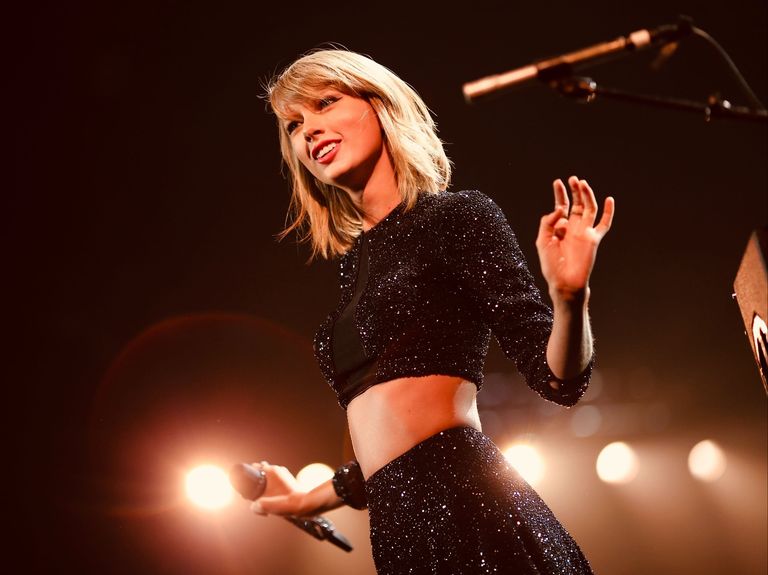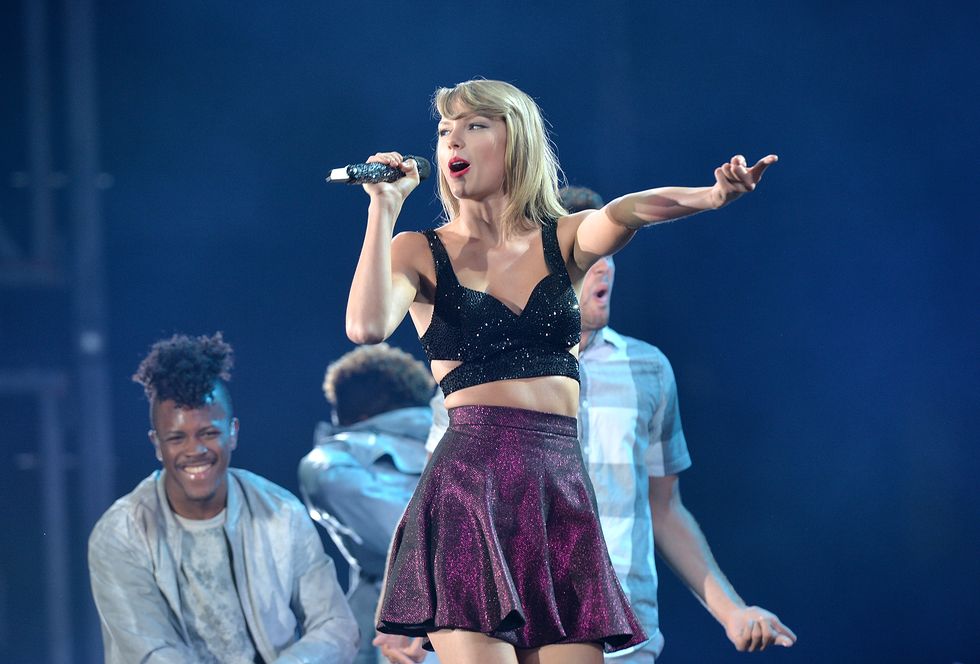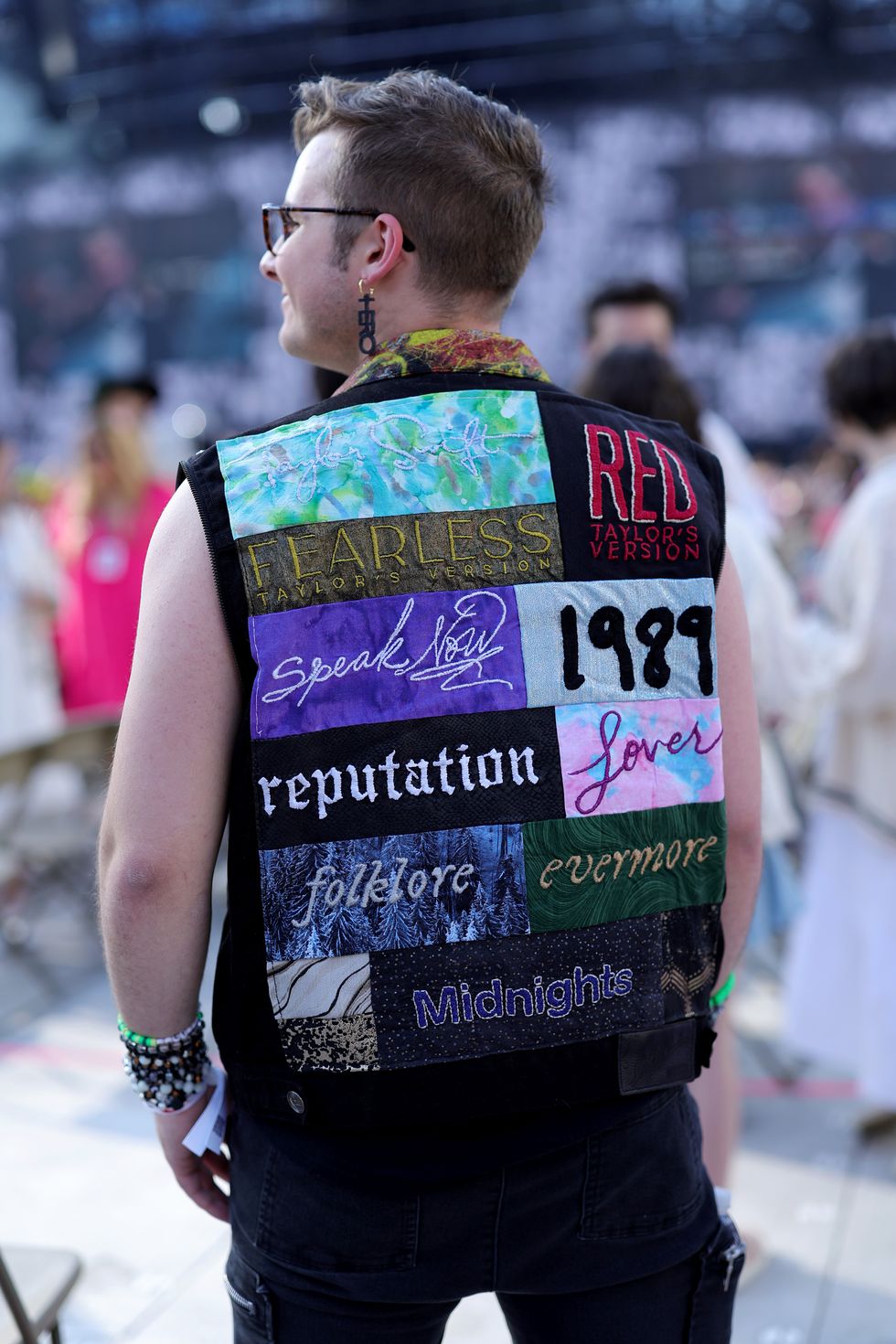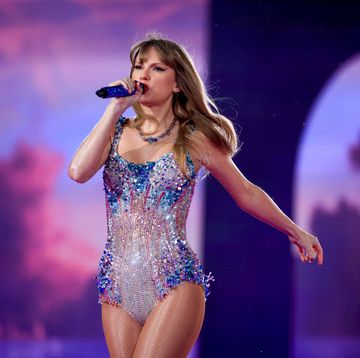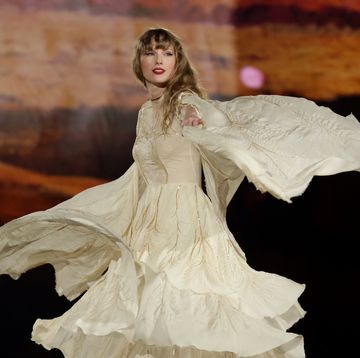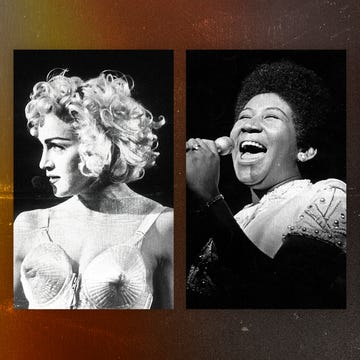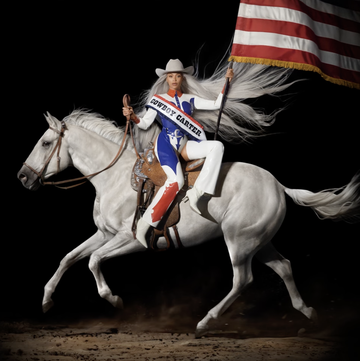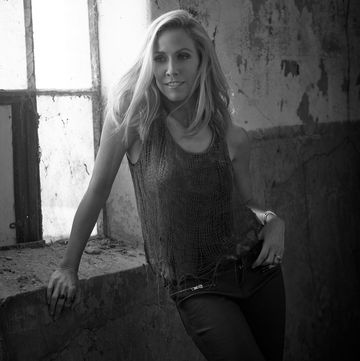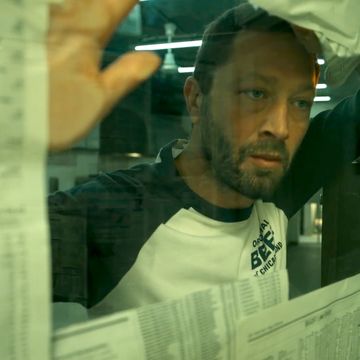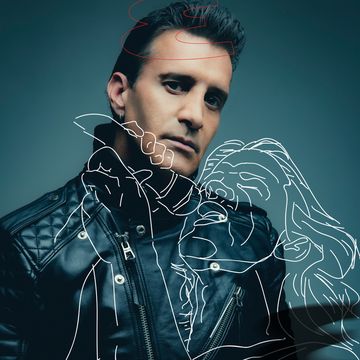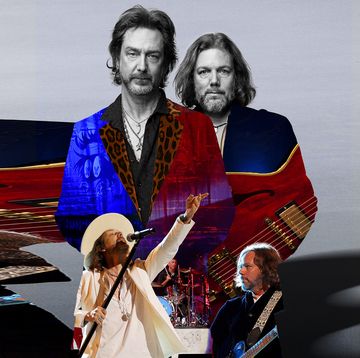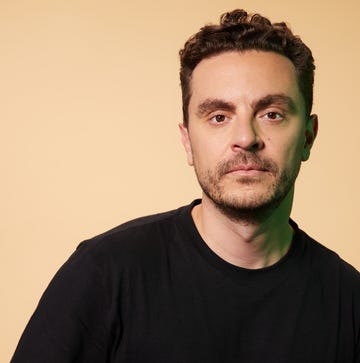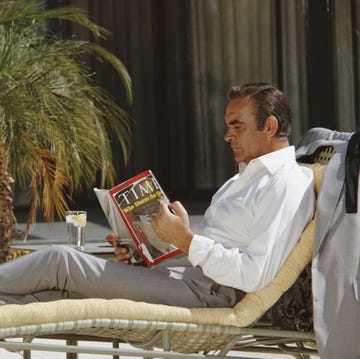I've been a fan of Taylor Swift since the country-twang, "Our Song" days—but I've only been a Swiftie for a couple weeks now. Three things needed to happen for my Swiftification: One, in Pittsburgh, I cashed in my "Eras Tour" ticket—if you're unfamiliar, Swift is partially through touring the world on what will likely become the first-ever billion-dollar tour—and felt the stadium's beams shake so violently that half the boyfriends refused to stand up. (My seat neighbor yelled to me: "HELL no!") Two: about three weeks later, I walked past Electric Lady Studios just as Swift escaped and darted into an SUV, likely putting the finishing touches on Speak Now (Taylor's Version). People screamed! I waved. The rerecorded album debuts today.
Three? I reread the great Scott Raab's interview with Swift, which ran in Esquire's November 2014 issue. It struck me as incredibly prescient—and unusual—for the time. Swift was readying to debut 1989, a searing, jubilant album that would land as a direct nuke to her critics, then at an all-time fever pitch. Raab slices right through it, remarking, "No one's actually paying attention to the human there." On her end, Swift is candid in a way she usually reserves for only her music nowadays: "It's all about walking a tightrope between not being so fragile and breakable that they can level you with one blow and being raw enough to feel it and write about it when you feel it," she tells Raab. Swift even pulls out a pair of earbuds, just to play "Shake It Off" for him. It's sweet. I hope you enjoy.—Brady Langmann
Raab meets the singer-songwriter for breakfast in downtown Manhattan a few days before her massive-hit single "Shake It Off" is released. She's coming from a promotional photo shoot for it, and after breakfast she'll head to L.A. to rehearse for the Video Music Awards later this afternoon. Her publicity manager and two bodyguards are seated at a table nearby. For Swift: scrambled eggs, no coffee.
SCOTT RAAB: It's 8:30 A.M. and you've already been working for two hours?
TAYLOR SWIFT: We were at the Empire State Building because we're shooting for the livestream on Monday. There will be a wide helicopter camera shot on the Empire State Building, and I will be up on the top platform waving. It's so exciting to unveil who you've been for the last two years. My life has changed drastically in the last year and a half.
SR: Musically? Geographically?
TS: Everything. I never thought I'd live in New York, because I thought I'd be too overwhelmed by how busy and bright and crazy the city is. Then all of a sudden, this year, all I wanted to do was live in New York. I never thought I would be so happy being completely unattached to anyone romantically.
SR: Why do you think there's so much attention paid to your dating habits?
TS: I think with every celebrity story there has to be a "Yeah, but …" Take Beyoncé: She's incredibly talented, gorgeous, perfect role model for girls, empowering women all over the world. Yeah, but … let's try to pick at her marriage. I think that every celebrity has that. And predominantly women, unfortunately.
SR: You're judged constantly. Your private life is clickbait.
TS: I would date someone, figure out we weren't compatible or figure out we didn't work out, and then we'd break up. That seems like a very normal thing for a young 20-something to do, and that is my biggest scandal. I think it's healthy for everyone to go a few years without dating, just because you need to get to know who you are. And I've done more thinking and examining and figuring out how to cope with things on my own than I would have if I had been focusing on someone else's emotions and someone else's schedule. It's been really good.
SR: I think I was watching an Ellen clip—it might have been Chelsea Handler—and she's teasing you, and at one point you said, "No one listens to me!" And it wasn't that you were that aggravated, but it stuck in my head because I think that's true: No one's actually paying attention to the human there.
TS: It doesn't seem like a possibility at this point in my life. What does seem possible and easy and comfortable is having this entire league of incredible girlfriends that I have. And I can trust them, and the reason I know I can trust them is because nothing true about me is being written in the press right now.
SR: You knew what your passion was early. It must take an incredible amount of energy to sustain that passion.
TS: I'm very busy, and I'm tired a lot. I was talking to [songwriter-producer] Ryan Tedder about this the other day, because we're both equal left- and right-brain people. So there's part of our brain that we shut off when we're in the studio. There's part of our brain that we turn on when we are out doing an interview or promoting something or waking up at six in the morning for hair and makeup. I think if that pressure came from other people, I would feel very weighed down by it. But the pressure comes from me, so I can't really say anything about it, because I'm the one saying to myself, You have to make a better album than you made last time. There is no other option. Otherwise, don't make an album.
SR: I know that you have an infrastructure with family and all that, but do you ever feel like it's a runaway train?
TS: No. The only thing I can't control is the spin in the press. And so if I know I can't control that, I have to let it go. In some ways, though, you can control it. I really didn't like the whole serial-dater thing. I thought it was a really sexist angle on my life. And so I just stopped dating people, because it meant a lot to me to set the record straight—that I do not need some guy around in order to get inspiration, in order to make a great record, in order to live my life, in order to feel okay about myself. And I wanted to show my fans the same thing.
SR: You have your own jet?
TS: Yeah, isn't that crazy?
SR: You still do the meet-and-greets?
TS: We do four before the show and one after.
SR: That's country music, where it's not just about the songs.
TS: Country music teaches you to work. You hear stories about these artists who show up four hours late to a photo shoot, and in Nashville that doesn't happen. In Nashville, if you go four hours late to a photo shoot, everyone leaves. In Nashville, if you don't care about radio and being kind to the people who are being good to you … It's a symbiotic relationship, and if you don't take care of it, then they won't take care of you. I've never been more proud to have come from a community that's so rooted in songwriting, so rooted in hard work and in treating people well. It was the best kind of training.
SR: I've read about you writing thank-you notes to deejays.
TS: I love writing thank-you notes. There's something very nostalgic to me about the feel of a card and putting pen to paper. How many times in our lives are we required to put pen to paper anymore?
SR: I haven't written anyone a letter in years.
TS: There's something romantic and sort of lost about it. I like things you can touch and things you can keep, because every bit of communication we have is ephemeral in nature. You can just delete an e-mail and it's like it was never there.
SR: You seem utterly sane.
TS: Thank you.
SR: I mistrust that somehow.
TS: You don't need to be cynical about it!
SR: It's not you. It's my job.
TS: That's what I don't like about celebrity culture and the obsession with it, and the takedown culture that we seem to be in. You have celebrities who are pushed to the brink of a public meltdown, and so the public thinks that every person in the public eye has dirty secrets that they're keeping, or isn't what they seem, or is masking it and faking sincerity, faking authenticity, faking being surprised at award shows when you win a Grammy.
SR: There's a certain cruelty to it. When the meltdown does happen, people couldn't be more thrilled, especially if it's a young woman.
TS: I'm not gonna let them make me have a meltdown. But, I think, as a songwriter you lose your edge if you find a way to protect yourself from everything they're going to say about you. You lose touch with what made you vulnerable enough to connect with people in your songwriting. And that's not something I wanna do. So it's all about walking a tightrope between not being so fragile and breakable that they can level you with one blow and being raw enough to feel it and write about it when you feel it. And it's not just a celebrity-takedown culture. It's a takedown culture. I know it when I see these kids—they're gonna get tortured socially until they find their calling in life.
SR: You went through that kind of thing yourself in school.
TS: I never felt like the kids in school were right about me when they'd say, "She's weird. She's annoying. I don't want to hang out with her." I always remember writing in my journal, saying, I just have to keep writing songs. I just have to keep doing this and someday, maybe, this will be different for me. I just have to keep working.
SR: They seem like nice guys, your bodyguards.
TS: They're really nice. They're incredible.
SR: I've never interviewed anyone who brought security.
TS: I fought the idea of having security for a very long time, because I really value normalcy. I really do. I like to be able to take a drive by myself. Haven't done that in six years.
SR: Even in Tennessee?
TS: No, they have to be in a car behind me. Because just the sheer number of men we have in a file who have showed up at my house, showed up at my mom's house, threatened to either kill me, kidnap me, or marry me. This is the strange and sad part of my life that I try not to think about. I try to be lighthearted about it, because I don't ever want to be scared. I don't want to be walking down the street scared. And when I have security, I don't have to be scared.
SR: Do you still have connections with human beings?
TS: It's a social situation every time I go out, but if I know I can't deal with talking to people that day, I just don't go out. I just have to wake up in the morning and say, How am I feeling today? If someone asks for a picture, am I gonna feel imposed upon today because I'm dealing with my own stuff? Am I gonna take my own stuff out on some innocent 14-year-old today and be in a bad mood? Okay, maybe not … Maybe I won't leave the house. I try really hard not to take bad days out on other people. Because I will get asked for an autograph, and I will get asked for a picture, and there will be someone with their cell phone filming me at a restaurant. If I'm not in the mood for that, I just kind of stay in. And that's fine. Those days don't happen very often. I try really hard to keep it light. Joy, enthusiasm, excitement—those are sort of my chief attributes.
SR: I read that you finished two years of high school in 12 months.
TS: That was just the most practical way to do it.
SR: But not everyone could do it.
TS: My parents were very strict about education and hard work, from the time my brother and I were really little kids.
SR: You and your family lived on a Christmas-tree farm? That's a unique place to grow up.
TS: It was such a weird place to grow up. But it has cemented in me this unnatural level of excitement about fall and then the holiday season. My friends are so sick of me talking about autumn coming. They're like, "What are you, an elf?"
SR: Who took care of the tree business?
TS: My dad.
SR: I thought he was a Merrill Lynch guy.
TS: He'd tend to the farm as his hobby. He'd get up four hours early to go mow the fields on his tractor. We all had jobs. Mine was picking the praying-mantis pods off of the trees, collecting them so that the bugs wouldn't hatch inside people's houses.
SR: How old were you?
TS: From five to ten. The only reason that was my job was because I was too little to help lift trees.
SR: You've mentioned your grandmother in past interviews. What kind of singing did she do?
TS: She sang opera. She would sing in whatever city-opera production when my grandfather was working. He was an engineer and he would travel a lot, building bridges. She even was a cohost on this show called The Pan American Show, in Puerto Rico, and she was beautiful and graceful but spoke the worst Spanish you've ever heard. All the Spanish-speaking fans in Puerto Rico just loved her, because she was so brave about how terrible she was at speaking Spanish. She tried every night. And then she'd get up and sing, and, of course, it was the perfect, beautiful operatic voice. Gorgeous soprano.
SR: Have you seen yourself in The Giver?
TS: I saw the movie. It's hard for me to separate myself from myself. I just see me in a brown wig and I think, Oh, I look so weird there. Why does my face look so weird? Oh, I hate the sound of my voice. Music is the only thing that's ever fit me like that little black dress you wear every single time you go out. Other things fit me for certain seasons, but music is the only thing that I would wear all year round. [To her manager]Can I play him something? So this is the first single—this is about the most important lesson I've learned in the last couple of years. ["Shake It Off" plays through earbuds.] Well, that's that.
SR: Nice. I think you're gonna be big.
TS: Thank you!
SR: You have a great sense of humor, but you keep it kind of hidden. It's self-effacing and a little sarcastic, but you use it very judiciously.
TS: I think it's nice to have some tricks up your sleeve. Everybody sees every part of everything I do, and they all draw their own conclusions from it, so there has to be a little bit of you that people only get when they're in person with you.
SR: Do you ever feel trapped in the persona of sweetness, innocence, purity?
TS: No, because I'm realistic about the fact that millions of people don't have time in their day to maintain a complex profile of who I am. They're busy with their work and their kids and their husband or their boyfriend and their friends. They only have time to come up with about two or three adjectives to describe people in the public eye. And that's okay. As long as those three adjectives aren't train wreck, mess, terrible. I figure eventually, if you hang around long enough, people will see all sides of you.
SR: More evidence of your sanity.
TS: When I was a little kid, my friends were watching Disney Channel, but I was watching Behind the Music. And I was drawing these conclusions, like the reason these people went off the rails is because they lost their level of self-awareness. They turned a blind eye to things they didn't want to see, and all of a sudden all they were seeing were their delusions of grandeur. And I never wanted to make that mistake in my life, regardless of what my career ended up being. I take away these kind of life lessons from that show.
SR: You've thought about this.
TS: I have a lot of time. That's all I do.
